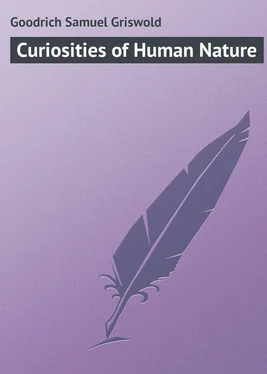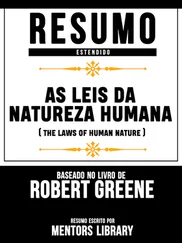Samuel Goodrich - Curiosities of Human Nature
Здесь есть возможность читать онлайн «Samuel Goodrich - Curiosities of Human Nature» — ознакомительный отрывок электронной книги совершенно бесплатно, а после прочтения отрывка купить полную версию. В некоторых случаях можно слушать аудио, скачать через торрент в формате fb2 и присутствует краткое содержание. Жанр: foreign_prose, на английском языке. Описание произведения, (предисловие) а так же отзывы посетителей доступны на портале библиотеки ЛибКат.
- Название:Curiosities of Human Nature
- Автор:
- Жанр:
- Год:неизвестен
- ISBN:нет данных
- Рейтинг книги:3 / 5. Голосов: 1
-
Избранное:Добавить в избранное
- Отзывы:
-
Ваша оценка:
- 60
- 1
- 2
- 3
- 4
- 5
Curiosities of Human Nature: краткое содержание, описание и аннотация
Предлагаем к чтению аннотацию, описание, краткое содержание или предисловие (зависит от того, что написал сам автор книги «Curiosities of Human Nature»). Если вы не нашли необходимую информацию о книге — напишите в комментариях, мы постараемся отыскать её.
Curiosities of Human Nature — читать онлайн ознакомительный отрывок
Ниже представлен текст книги, разбитый по страницам. Система сохранения места последней прочитанной страницы, позволяет с удобством читать онлайн бесплатно книгу «Curiosities of Human Nature», без необходимости каждый раз заново искать на чём Вы остановились. Поставьте закладку, и сможете в любой момент перейти на страницу, на которой закончили чтение.
Интервал:
Закладка:
This early disposition to observation led his parents to place him under the care of the clergyman of the village, who gave him the first elements of learning.
His ardor for study then became extreme: the day was not long enough for him; and he often read a great part of the night by the light of the lamp that was burning in the church of the village, his family being too poor to allow him candles for his nocturnal studies. He often took only four hours sleep in the night. At the age of ten, he harangued his bishop in Latin, who was passing through the village on his visitation; and he did this with such ease and spirit, that the prelate exclaimed – "That lad will, one day or other, be the wonder of his age." The modest and unassuming conduct of Gassendi gave an additional charm to his talents.
In his manners, this remarkable youth was in general silent, never ostentatiously obtruding upon others, either the acuteness of his understanding, or the eloquence of his conversation; he was never in a hurry to give his opinion before he knew that of the persons who were conversing with him. When men of learning introduced themselves to him, he was contented with behaving to them with great civility, and was not anxious to surprise them into admiration. The entire tendency of his studies was to make himself wiser and better; and to have his intention more constantly before his eyes, he had all his books inscribed with these words, Sapere aude ; "Dare to be wise."
Such was Gassendi's reputation, that at sixteen he was called to teach rhetoric at the seminary of Digne; in 1614, he was made professor of theology in the same institution; and two years after, he was invited to fill the chair of divinity and philosophy at Aix. After passing through various promotions, and publishing several works of great merit on philosophical subjects, Gassendi went at last to Paris, where he gained the friendship of Cardinal Richelieu, and shared the admiration of the learned world with the famous philosopher, Descartes.
Being appointed a professor of mathematics in the College Royal of Paris, he gave his attention to astronomical subjects, and greatly increased his reputation. After a life devoted to science, in which his achievements were wonderful, he died at Paris, October 14, 1655, aged sixty-three years. Distinguished by his vast learning, his admirable clearness of mind, the diversity of his acquirements, the calmness and dignity of his character, and the amiableness of his manners, Gassendi was alike one of the brightest ornaments of his age and of human nature.
PASCAL
Blaise Pascal "perhaps the most brilliant intellect that ever lighted on this lower world," was born at Clermont, in the province of Auvergne, on the 19th of June, 1623. He was descended from one of the best families in that province. As soon as he was able to speak, he discovered marks of extraordinary capacity. This he evinced, not only by the general pertinency and acuteness of his replies, but also by the questions which he asked concerning the nature of things, and his reasonings upon them, which were much superior to what is common at his age. His mother having died in 1626, his father, who was an excellent scholar and an able mathematician, and who lived in habits of intimacy with several persons of the greatest learning and science at that time in France, determined to take upon himself the whole charge of his son's education.
One of the instances in which young Pascal displayed his disposition to reason upon everything, is the following. He had been told that God rested from his labors on the seventh day, and hallowed it, and had commanded all mankind to suspend their labor and do no work on the Sabbath. When he was about seven years of age, he was seen, of a Sabbath morning, measuring some blades of grass. When asked what he was doing, he replied that he was going to see if the grass grew on Sunday, and if God ceased working on the Sabbath, as he had commanded mankind to do!
Before young Pascal had attained his twelfth year, two circumstances occurred, which deserve to be recorded, as they discovered the turn, and evinced the superiority, of his mind. Having remarked one day, at table, the sound produced by a person accidentally striking an earthenware plate with a knife, and that the vibrations were immediately stopped by putting his hand on the plate, he became anxious to investigate the cause of this phenomenon; he employed himself in making a number of experiments on sound, the results of which he committed to writing, so as to form a little treatise on the subject, which was found very correct and ingenious.
The other occurrence was his first acquisition, or, as it might not be improperly termed, his invention of geometry. His father, though very fond of mathematics, had studiously kept from his son all the means of becoming acquainted with this subject. This he did, partly in conformity to the maxim he had hitherto followed, of keeping his son superior to his task; and partly from an apprehension that a science so engaging, and at the same time so abstracted, and which, on that account, was peculiarly suited to the turn of his son's mind, would probably absorb too much of his attention, and stop the progress of his other studies, if he were at once initiated into it.
But the activity of an inquisitive and penetrating mind is not to be so easily restrained. As, from respect to his father's authority, however, the youth had so far regarded his prohibition as to pursue this study only in private, and at his hours of recreation, he went on for some time undiscovered. But one day, while he was employed in this manner, his father accidentally came into the room, unobserved by Pascal, who was wholly intent on the subject of his investigation. His father stood for some time unperceived, and observed, with the greatest astonishment, that his son was surrounded with geometrical figures, and was then actually employed in finding out the proportion of the angles formed by a triangle, one side of which is produced; which is the subject of the thirty-second proposition in the First Book of Euclid.
The father at length asked his son what he was doing. The latter, surprised and confused to find his father was there, told him he wanted to find out this and that, mentioning the different parts contained in that theorem. His father then asked how he came to inquire about that. He replied, that he had found out such a thing, naming some of the more simple problems; and thus, in reply to different questions, he showed that he had gone on his own investigations, totally unassisted, from the most simple definition in geometry, to Euclid's thirty-second proposition. This, it must be remembered, was when Pascal was but twelve years of age.
His subsequent progress perfectly accorded with this extraordinary display of talent. His father now gave him Euclid's Elements to peruse at his hours of recreation. He read them, and understood them, without any assistance. His progress was so rapid that he was soon admitted to the meetings of a society of which his father, Roberval, and some other celebrated mathematicians were members, and from which afterwards originated the Royal Academy of Sciences, at Paris.
During Pascal's residence with his father at Rouen, and while he was only in his nineteenth year, he invented his famous arithmetical machine, by which all numerical calculations, however complex, can be made by the mechanical operation of its different parts, without any arithmetical skill in the person who uses it. He had a patent for this invention in 1649. His studies, however, began to be interrupted when he reached his eighteenth year by some symptoms of ill health, which were thought to be the effect of intense application, and which never afterwards entirely quitted him; so that he was sometimes accustomed to say, that from the time he was eighteen, he had never passed a day without pain. But Pascal, though out of health, was still Pascal; ever active, ever inquiring, and satisfied only with that for which an adequate reason could be assigned. Having heard of the experiments instituted by Torricelli, to find out the cause of the rise of water in fountains and pumps, and of the mercury in the barometer, he was induced to repeat them, and to make others, to satisfy himself upon the subject.
Читать дальшеИнтервал:
Закладка:
Похожие книги на «Curiosities of Human Nature»
Представляем Вашему вниманию похожие книги на «Curiosities of Human Nature» списком для выбора. Мы отобрали схожую по названию и смыслу литературу в надежде предоставить читателям больше вариантов отыскать новые, интересные, ещё непрочитанные произведения.
Обсуждение, отзывы о книге «Curiosities of Human Nature» и просто собственные мнения читателей. Оставьте ваши комментарии, напишите, что Вы думаете о произведении, его смысле или главных героях. Укажите что конкретно понравилось, а что нет, и почему Вы так считаете.












